#that’s the President of Honduras you know?
Explore tagged Tumblr posts
Text


I appreciate addison’s apparent distaste for American colonialism of Hawaii but I get the feeling that I’m not ever going to see this event mentioned in any book about queen lilioukalani.
#mizner blogging#by the way remember when that last biography mentioned#Addison talking about a lady love in his autobiography and misspelled her name?#I think he just misspells things#he got the president of honduras’ name wrong#consistently spelled it barriose rather than barrios#which I know is just adding an e to the end but like#that’s the President of Honduras you know?#at least he got the queen of Hawaii’s name right. I think.#rude to be embarrassed about being knighted
5 notes
·
View notes
Text
.
#went down a wikipedia rabbithole tonight and learned some chilean history#specifically around project cybersyn#President Salvador Allende#and the 1973 Military coup#and uh#fucking tragic#i think ive existed in a strange(? maybe its actually relatively common idrk) position as an American leftist where like#the crimes of american imperialism feel so innumerable to where at a certain point you stop learning about them on purpose#so like for years ive 'known' that what the USG has done to South America was awful#i 'learned' about honduras and so I just applied that as a template and went 'yeah some awful shit happened and its the CIAs fault'#but uh getting a bit more detailed knowledge about what our government did in chile has made me realize how callous that was#i dont know that ive nessecarily earned my previous attitude of 'cold detached and depressed' given#that not only did I not live through any of it but also that it was done in my benefit#god maybe this is some milquetoast shit#idk#I think being a leftist in the US is having to fight the passivating force of imperialism constantly#like lose sight of it for a second and it just fucking blends back in with the landscape#the internally defensive structure you build in your brain to protect yourself from complete emotional collapse while buying food#will equally be effective in ignoring the role of imperialism in everything else#anyway#I think this is perhaps a good opportunity to learn more about the other crimes the USG has committed in South America#to actually know the names and pronunciation of the deomcratically elected socialist leaders we deposed and what they really wanted to do#to know how their people felt and thought about things rather than imposing my own assumptions onto a reigon I am utterly ignorant of#it is embarrassing now to know the fullness of history I have ignored#Salvador Allendes words really fucking got to me and to think that there are men like him who I cannot even name is really disappointing#im going to stop self flaggellating and see about that reading#just my thoughts#feeling a little blue tonight
2 notes
·
View notes
Text
Tim Kaine
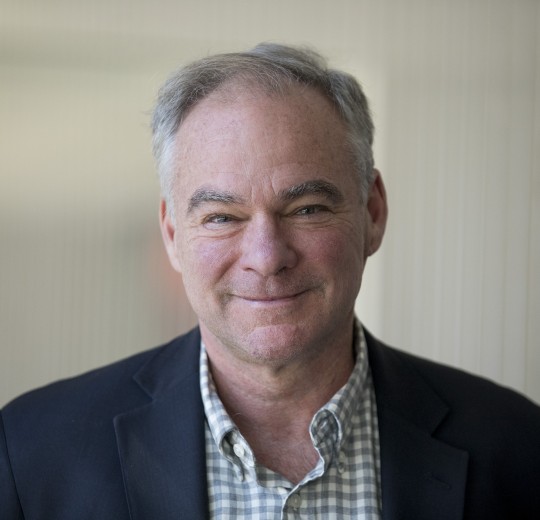
Physique: Average Build Height: 5’ 11" (1.8 m)
Timothy Michael Kaine (born February 26, 1958-) is an American lawyer and politician serving as the junior United States senator from Virginia since 2013. A member of the Democratic Party, he served as the 70th governor of Virginia from 2006 to 2010, and as the 38th lieutenant governor of Virginia from 2002 to 2006. Kaine was the Democratic nominee for vice president of the United States in the 2016 election as Hillary Clinton's running mate.
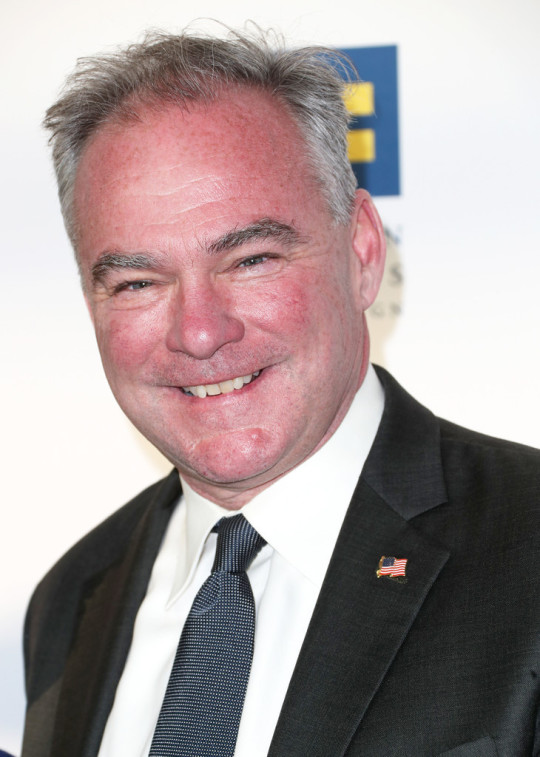
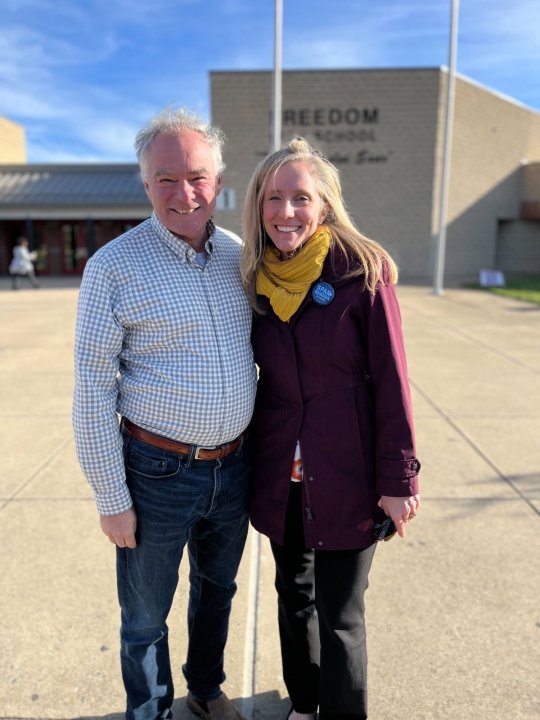


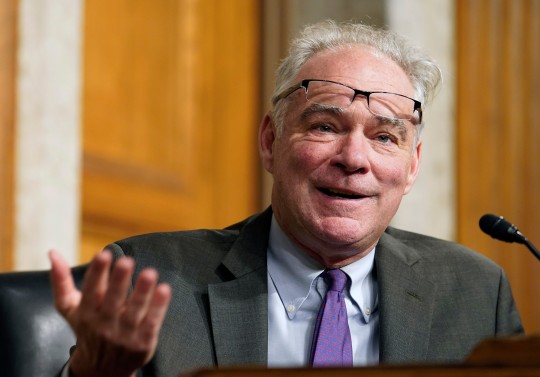
He's handsome and is widely described by people in his political orbit as a likable if less than charismatic figure. Just by the look in his eyes makes me think you can have an all around good time with Tim and could be a hell of a good fuck.



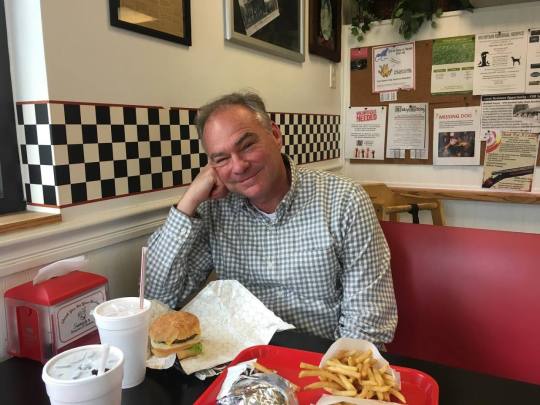

Now, what exciting facts can I tell you about Sen. Kaine? Well, of course he’s married with three children. He plays the harmonica and often travels with several. And he’s fluent in Spanish as a result of his nine months in Honduras. But what is most important is that he is really sexy looking. I’m not sure how knowing all that sits in relation to him being involved in a weekend fuckfest with just the two of us, but I can fantasize.

192 notes
·
View notes
Text
Daily update post:
Probably the biggest news in Israel today is how many of the hostages are already confirmed dead. The thing isn't that we didn't know some were. If you've been following my update posts, then you know that more than once, we got the news that a hostage was confirmed to have been killed, and their body held hostage in Gaza. The thing is that up until now, no one talked about the total number of dead, or the number of those with an indication (which still needs to be verified) that they might be dead. So here are the numbers, as published: out of the official number of 136 Israeli hostages in Gaza, 32 are dead bodies, with the IDF trying to determine whether at least 20 more were also killed. That means that it's confirmed there are no more than 104 living hostages abducted from Israel and held in Gaza, and potentially no more than 84.

In the wake of the Oct 7 massacre, Hamas has been self contradictory. On the one hand, they shared footage of the carnage themselves, many times live (this website is dressed as if it's Hamas', and presents some of the evidence from that day, for all the deniers). The footage and testimonies of survivors, as well as forensic evidence collected from the slain shows that civilian communities were intentionally targeted, and that women, men, kids were intentionally raped, maimed and murdered under close proximity, where no mistake about the identity of the victims could have been made. A Hamas senior has openly said that they would repeat the massacre until Israel is destroyed. All of Israel destroyed obviously harms the civilians, including the women and kids. Following the massacre, Hamas has also called for Oct 13 to be a global 'Day of Rage' where Hamas supporters were called upon to attack Israelis and Jews worldwide. They did not specify leaving women and kids out of it, and when Jews are made into targets globally, meaning way beyond Israel and its army, that obviously means civilians. Yet at the same time, Hamas has denied having targeted civilians, that if Hamas did kill them it was due to confusion, and even blamed Israel for the civilian deaths. But now, Israel has released evidence of a book of fatwas (Islamic religious decrees) found in Gaza, which exlpictly allowed the Hamas terrorists to target civilians, including women and kids. The pic on the right shows the cover of the fatwas book, with Hamas' emblem, and the left shows the relevant fatwa.

The newly elected president of Argentina is visiting Israel, to announce the moving of the Argentinian embassy to Jerusalem. I'm just gonna remind everyone that foreign embassies normally are in a country's capital, and that foreign countries don't get to choose a capital instead of a country's own people. In fact, I personally don't know of any other case where foreign nations refuse to acknowledge a country's choice of capital by keeping their embassies out of there. Originally, the refusal to recognize Jerusalem as Israel's capital happened before the war in 1967 (when the two parts of the city, torn apart by Jordan in 1948, which also ethnically cleansed East Jerusalem of Jews, were re-united), and was connected to the fact that in the 1947 UN partition plan (which wasn't legally binding, and was nullified by the Arabs' refusal to accept it, and them starting a war against Israel), Jerusalem was supposed to be an internationally governed area. In other words, this isn't the world acting on behalf of the Palestinians, it's acting on behalf of its own political and religious interests in the historical Jewish capital, and the city holiest to Judaism for over 3,000 years. Currently, Jerusalem is home to the embassies of the US, Honduras, Guatemala, Kosovo (the first Muslim country to have an embassy there), and Papua New Guinea.

And while it's not an official embassy, because it doesn't represent an actual country, the other day a symbolic one was opened in Jerusalem, the Indigenous People embassy. And to see other native people connecting with the Jews, who are native to the Land of Israel, warms my heart. The embassy may not be an official one, but it has the support of various indigenous leaders from around the world, and its opening was attended by over 100 ambassadors.

This is 42 years old Lara Tannous.
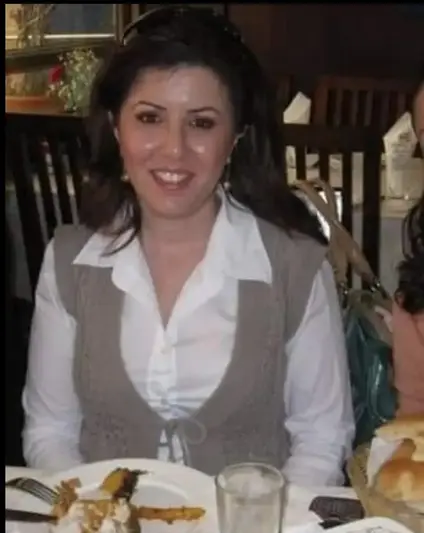
She's a Palestinian from East Jerusalem. On Jan 7, 3 Palestinian terrorists opened fire at the car she was in. Another Palestinian man who was driving along the same road, 32 years old Amar Mansour, was killed immediately. Lara was seriously wounded. She was hospitalized in Hadassah Ein Kerem, the Jerusalem medical center where she's been working as a pharmacist for the last 17 years, but succumbed to her wounds on Jan 24. She was buried in the Palestinian-ruled city of Ramallah. The three terrorists thought they were shooting at Jews. According to at least one source, they were 2 doctors and a male nurse, before choosing to take lives instead. This morning, I happened to undergo a procedure at Hadassah. Before leaving, I noticed there's a corner for the workers or their family members killed on or since Oct 7. Here's the corner dedicated to the hostages, the one to the victims of Palestinian terrorism, and one zoomed in pic, where you can see Lara's photograph a bit better:

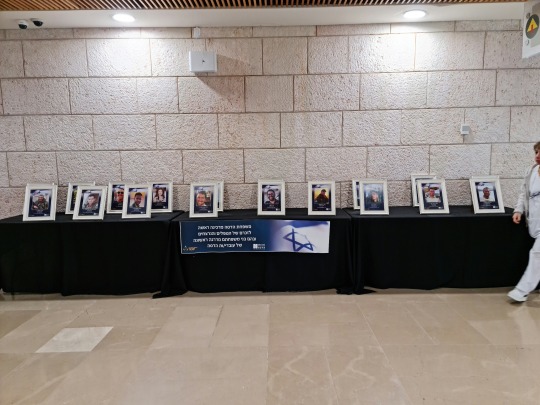

(for all of my updates and ask replies regarding Israel, click here)
#israel#antisemitism#israeli#israel news#israel under attack#israel under fire#terrorism#anti terrorism#hamas#antisemitic#antisemites#jews#jew#judaism#jumblr#frumblr#jewish#resources
101 notes
·
View notes
Note
More ppl has been deported under Biden than Trump, which is kinda funny in its irony
I don’t know why the anons on this site have decided I should be the receptacle for all of Joe Biden’s perceived sins. Maybe they just like hearing me talk.
The only time in recent memory I have referenced deportation with regards to the current political climate is that Trump has stated he wants to deport American Muslims after Hamas’ attack on Israel in October.
“Deportation” is a morally neutral legal action. There are plenty of “good” reasons to deport someone—if, say, you’ve identified they are spying for a foreign power or if they had fled to your country to avoid rightful prosecution by the legal systems of their own country.
And there are plenty of “bad” reasons to deport someone—because you are targeting them because of their sincerely held religious beliefs, as an example.
Specifically I would guess that you are referencing Title 42 deportations, of which Biden does have a higher total number. But Biden also experienced a higher total volume of immigrants at the border, and when you take the total number of deportations as a percentage of encounters, you start to see a little different story.
Along the way, Biden has worked to end Trump’s inhumane “Remain in Mexico” policy, which lead to the kidnap, rape, and abuse of more than 1,500 migrants. A Trump-appointed judge ruled Biden had improperly ended the policy, forcing the government back into enforcing it, and the Biden Administration took the fight to the Supreme Court and won, ending the policy officially.
During Trump’s administration, he intentionally separated families at the border. At least 3,900 children were separated from their families.
Biden has worked to reunite the majority of those families—2,500 children have been returned to their parents so far—and rolled out family reunification programs for citizens of certain countries - including Honduras, El Salvador, Guatemala and Colombia - who have relatives in the US.
Trump made little use of parole—the system by which migrants may be allowed into the country even if they do not currently qualify for a visa—and has said he would end parole status for migrants in his future term.
Biden has been one of the most pro-parole Presidents in history, and as many as 30,000 migrants are able to fly in to the US per month through the program, including vulnerable people from Afghanistan and Ukraine, in particular when they are found to have a credible fear of persecution or torture in their home country.
So, as I have said in post after post, I ask you again—
Will we neglect the *good* because it is not perfect? Will we embrace the *bad* because we are unsatisfied with *good?* Will we risk the ruination of our democratic norms because in a difficult political environment, Biden did the best that was available and politically viable at the time?
Vote blue this November. And when you do, remember that you’re doing it to keep families together, that you’re doing it to grant 30,000 people parole status every month, that you’re doing it to end the inhumane Remain in Mexico policy. And remember that you’re doing it not because the results will be perfect, but because they will be a step forward.
The road will be bumpy. But every bump is worth it.
21 notes
·
View notes
Text
Oh my god this got so long. I swore to myself that I was going to be normal about this and not just dump all of my headcanon immediately but like
Do you ever think about the fact that in the 1950s & 1960s there just were not that many nuclear weapons blueprints out there (and most of the document stealing was done by long term plants, not high risk guys like Curt & Owen)
If you were a spy during the Cold War you were most likely doing regime change. You were arming, training, and supplying coups. You were helping set the stage for American or UK capital to set up shop and repress and enslave Indigenous populations and export every drop of wealth possible from the global south. You were fighting a proxy war against "communism" (which often just meant workers striking for better conditions, at least intially) all across the globe.
With that context I think a lot about the coup in Guatemala in 1954, where the CIA trained and armed the coup and overthrew the democratically elected president of Guatemala (Jacobo Árbenz Guzmán) at the behest of the United Fruit Company. Árbenz was left of center, and he had land reforms planned that would compensate UFCO for their land, appropriate it, and redistribute it to workers. Guatemala offered to pay the value listed on UFCO tax documents (1.2 million), but UFCO demanded 16 million
If I start talking about this I'll never stop, but long story short UFCO had spent 50+ years gobbling up all the land in Guatemala, grew Bananas and exported them for massive profits, and terrorized or outright massacred Indigenous workers to keep them in line. The 1954 coup and the subsequent I think its 36 years of civil war in Guatemala is all down to the CIA doing a coup because the head of the CIA (Allen Dulles) was on the board of United Fruit and they wanted that blood money baby. It was a genocide.
Hard swerve back into it here: I don't know about Owen, but at least Agent Curt Mega had a *very* good chance of participating in the 1954 coup. In creating a literal Banana Republic (a puppet government controlled by US interests). I tend to think Owen was there too because it's more interesting that way. I think it's a mistake to focus exclusively on the Russian cat vs mouse and ignore the larger geopolitical context of the cold war.
Owen "dies" because of Curt's hubris- not just the drinking and talking him into risks he isn't comfortable with, but with his job at A.S.S., because someone else points and Curt shoots. In my headcanon Curt helped to create a banana republic that harmed and killed an incredible number of people, and he is just as careless when he leaves his banana peel on the stairs and "kills" Owen. Curt is absolutely firm in the belief that he is one of the good guys. And I think Owen was prolly the same way- until his body got wrecked and he got abandoned by the man he loved and he had a long, long time to think about the foreign policy of his government and what he and Curt really *did* on their fun lil spy jaunts.
If Owen was in Honduras (where they staged the Guatemala coup), then he has to reckon with the fact that he "died" due to *his own* hubris as well. He has to process that he joined the intelligence game because he grew up during the Blitz, during WWII, but that post WWII Britain was doing the same imperialist bullshit the US was. That Owen wasn't saving the world, he was destroying it. He was crushing half the planet under the thumb of British power. He was enacting the very genocides he joined up to prevent. That's why he wants a world with "no more agencies, no more spies, no more secrets."
So when Chimera offers Owen the chance to undermine US & UK interests, to take the power out of their hands by using and discarding a ridiculous n*zi, Owen just goes for it. I don't subscribe to the Chimera brainwashing theory, I like to think Owen joined Chimera because post-banana he became ideologically aligned with Chimera.
I imagine Chimera pulled him out of the rubble and got him back on his feet, and whispered in his ear about US/UK imperialism. We can argue about whether the ends justify the means, whether he goes too far, whether Chimera has pure intentions (doubt), but Owen isn't just some nightmare monster. He tells Curt "you've been blind" and "no one's innocent." He calls Curt a "caveman" and what is it, an "arrogant brute?" He has a rationale. He believes he is right. He's kind of a dick about it, but he has radicalized in a way Curt hasn't.
I think Owen sees Curt as clinging to cool guy spy shit (and the macho straight guy facade) instead of seeing the world for what it is. I think he probably also thinks about Alan Turing, about the UK arresting gay men- men who had previously been considered national heroes- for doing what Owen does (loving a man). I think he thinks about the US doing an elaborate and very public witchhunt of communists and gay people and anyone else who doesn't conform to good ol American capitalism. I think he insults Curt because he has been through a lot of shit that has changed his perspective, and he cannot believe that Curt *still doesn't see it*
I know there's the whole "DMA killed 1147 people, mostly girls from ages 14 to 22" kickstarter joke, but I'm sorry as much as I love Cynthia it'll be a cold day in hell before I believe anything the US state department says.
I don't think Agent Curt Mega is a perfect adorable babygirl who has never done anything wrong, I don't think Owen is (and has always been) a cruel and sadistic comic book villain. I think these are two men who loved each other in a time where it was very difficult, in a profession where they are literally the property of their respective governments. Where they could be arrested and forced into conversion therapy if they were discovered.
I think they were flawed (Curt cocky and careless, Owen condescending) but loved and respected each other as best they could, and when a massive trauma hits them they break different ways. Curt remains the lawful good, but Owen reframes his sense of right and wrong. I tend to think he did legit torture a lot of people, and even enjoyed it, but I think it was people related to these proxy wars, people related to these coups. People who could advance Chimera's objectives
I think Owen tortures Curt because he hates him, and he doesn't kill Curt (despite having soooo many chances) because he loves him. Owen has so much hesitation in the staircase scene. When Curt brings up their relationship he wavers and his face softens and his gun drops. He brings the gun back up, but despite having Curt at gunpoint for like 3 minutes he doesn't kill him. He hates him, but he loves him. If Curt takes the chance to talk to Owen, then maybe...
But Curt is convinced he is the good guy, which makes Owen the bad guy. And bad guys get put down like dogs. The ideological split is something Curt can't handle, so he shoots and kills his unarmed ex-lover. He just needs a win. He needs it to be over.
I don't have anything against anyone else's headcanon, I think it's a testament to how good Spies Are Forever really is that nearly 8 years later so many people still spend so much time taking apart this comedy musical about gay spies. But for me, it's more compelling if Owen is traumatized and flawed and ideologically opposed to the heroes of our story. I think it's more interesting that Curt kills the man he spent 4 years pining for because he can't accept the possibility that he could be the baddie.
Oh god I have to stop this is too much. But yeah. I've got feelings.
#spies are forever#curtwen#agent curt mega#owen carvour#tin can bros#Hahaha anyone else have an audhd hyperfixation??
36 notes
·
View notes
Note
I want to know what the politics in latin america are like currently, how are the elections there different and/or similar to the USA in guatemala, are you aware of whats going on in neighboring countries atm?
I am vaguely aware of Mexico and El Salvador but not too too much. Mexico's current government is a continuity government from a party that has been governing most of the 21st century. El Salvador is particularly notable for its strongman populist president who I'm told has been good for the violence problem but has also done more questionable stuff like making Bitcoin legal tender. (That was quite the novelty for me when I visited two years ago! All the signs saying "We accept Bitcoin here")
In Guatemala our election was just last year! We vote on 5 ballots:
President
Mayor
Regional District Congressmen
National List Congressmen
Representatives for PARLACEN (the Central American Parliament)
Presidentials are done with a run-off system. To win you need a simple majority of votes (50% + 1 vote), but you pretty much never get that on the first round of voting so the two top candidates go on to a second round about 2 months later.
Congress is decided on a party list proportional system. The country is divided into 23 electoral districts, representing the 22 departments + Guatemala City, and each is assigned a certain amount of congressmen based on population. These are distributed proportional to how many votes they got and then the parties assign the congressmen based on a list of all their potential candidates. There is additionally an electoral district that is voted on separately and which counts the whole country. This national list elects 32 congressmen, which at 160 congressmen total makes the national list 20% of the elected congressmen.
Mayor is pretty self explanatory.
And the most contentious is representatives to the Central American Parliament (PARLACEN). PARLACEN is supposed to be a forum for our countries to discuss diplomacy and formulate policies for international trade and cooperation. In practice they don't really, like, do anything. PARLACEN has a reputation for being a den of corrupt politicians who are only running because they want diplomatic immunity for 4 more years. Presidents of member countries (Guatemala, Honduras, El Salvador, Nicaragua, Panama, and the Dominican Republic) get a seat automatically after leaving office and that has always been super controversial.
In Guatemala this became particularly egregious in 2020 when outgoing President Jimmy Morales rushed his swearing in to office in order to shield himself from a lawsuit due to his mismanagement in office. Protestors were trying to prevent him from rushing into the PARLACEN building in Guatemala City so they could file the charges at the first hour of the morning. But he did end up managing to get sworn in and get legal immunity at the last minute.
For this reason a lot of the left here in Guatemala refuses to field candidates for PARLACEN and a pretty big portion of the population just intentionally spoils that ballot specifically.
Our current president is presiding over a 12+ party fractured government with a congressional minority. His party, Movimiento Semilla, is a center-left party who is focused on dismantling the corrupt structures of power more established politicians have already built. Their party has its beginnings in a protest movement that mobilized due to a corruption case in 2015 to demand the president and vice president to immediately resign. It has been an uphill battle and from his election the government tried every dirty trick they could to prevent him from taking power.
It's not been even a year since they have been in power, but I am optimistic about Movimiento Semilla so far. My biggest hope is that since they were electoral allies of the parties I support, the leftist indigenous rights coalition of Winaq and URNG Maíz, their growing support may spill over to them. I truly do think they are some of the very few principled people still in politics here.
3 notes
·
View notes
Text
Immigrants helped build this country, a fact no amount of racism or xenophobia can erase. Immigrants, including children, work in fields and factories, driving our economy. A group of immigrant men were working late last Tuesday night, filling potholes on Baltimore’s Francis Scott Key Bridge.
At 1:27 am, the Dali, a massive cargo vessel, 948-feet long and laden with roughly 4,700 shipping containers, lost power and rammed into the bridge, causing it to collapse. Two survived the disaster, six died. Only two of their bodies have been recovered from the cold, murky water of the Patapsco River.
Their tragic deaths occurred as increased immigrant arrivals are being exploited by former President Donald Trump and his right-wing extremist allies to foment division and to boost Trump’s presidential campaign. Just hours after the bridge collapse, FoxNews host Maria Bartiromo, interviewing Florida Republican Senator Rick Scott, attempted to link the maritime disaster to immigrants at the U.S.’ southern border:
“I want to understand the threats or the potential threats that this country is facing right now given the wide open border, the fact that we don’t know who is in the country. The FBI is looking… to ensure there was no foul play.”
“While we’re being talked about as like this invading horde that’s coming to destroy the country, what does this story actually show us? That immigrants are filling our potholes at night so that we can have a smooth drive to work in the morning.”
This is the same dog-whistle racism that Trump invoked in 2015, launching his first campaign: “When Mexico sends its people…They’re bringing drugs. They’re bringing crime. They’re rapists.” Trump continues his white supremacist ranting, saying at a recent Ohio campaign rally, “I don’t know if you call them people… These are animals and we have to stop it.”
Maximillian Alvarez, editor-in-chief of the Baltimore-based Real News Network, interviewed coworkers of the deceased. He said on the Democracy Now! news hour, “While we’re being talked about as like this invading horde that’s coming to destroy the country, what does this story actually show us? That immigrants are filling our potholes at night so that we can have a smooth drive to work in the morning.”
The six who died while working on the Key Bridge were hardworking men, from Mexico, Guatemala, Honduras, and El Salvador.
Miguel Luna was a welder, a 49-year-old father and grandfather, a native of the Usulután Department in El Salvador, ravaged by the U.S.-backed Salvadoran military and paramilitaries in the 1980s. He played on the professional soccer team in the town of Berlin in his home region. His widow, Maria del Carmen, owns a food truck. Miguel was a beloved member of his community.
Miguel and another victim of the collapse, Maynor Suazo Sandoval, were members of CASA, an immigrant rights non-profit founded in 1986 to build solidarity with those impacted by the U.S.-backed violence in Central America. CASA wrote, “Maynor migrated from Honduras over 17 years ago, and he alongside his brother Carlos were active members in the activist committee of Owings Mills… Carlos said ‘He was always so full of joy, and brought so much humor to our family.’ He was a husband, and father of two.”
Details are still emerging of the other named victims, Alejandro Hernandez Fuentes, 35, of Mexico and Dorlian Ronial Castillo Cabrera, 26, of Guatemala. Their bodies were found inside a pickup truck, submerged in the river. Two more victims, also reportedly from Mexico and Guatemala, remain unnamed by their respective governments.
Details are still emerging of the other named victims, Alejandro Hernandez Fuentes, 35, of Mexico and Dorlian Ronial Castillo Cabrera, 26, of Guatemala. Their bodies were found inside a pickup truck, submerged in the river. Two more victims, also reportedly from Mexico and Guatemala, remain unnamed by their respective governments.
Millions of enslaved people also built this country, a point worth remembering as we mourn the immigrant laborers on the Key Bridge. The bridge was named after Francis Scott Key since, while watching the British navy bombard Fort McHenry in 1814, not far from where the bridge was built in the 1970s, Key wrote the poem that would become the national anthem. His poem has four stanzas, the first made famous as “The Star Spangled Banner.” Key was a slave owner, and denounced those who fled enslavement in 1814 to fight against the United States, for the British, who promised them freedom in return.
“No refuge could save the hireling and slave, From the terror of flight or the gloom of the grave,” Key wrote in his poem, words left out of the national anthem, but which nevertheless noticeably rhyme with “Land of the free and home of the brave.” This should be considered by those tasked with naming the replacement bridge.
The lives of Miguel and the five other workers have been cut short, but the hatred of immigrants, sadly, is alive, well and growing this election year. Pledges from President Joe Biden to quickly open Baltimore’s port to commerce parallel campaign rhetoric on both sides to “shut down” the southern border to people seeking asylum.
“Immigrants like Miguel are building bridges to connect communities, not building walls to divide them,” CASA wrote, eulogizing Miguel Luna. Let those words inspire an embrace of immigrant communities, an anthem we can all rally around.
#us politics#biden administration#immigrant rights#immigration#immigrants#migrants#Migrant labor#baltimore#baltimore bridge collapse#Just like how Democrats have raised Police budgets and cut back on police oversight to look “tough on crime” for “suburban moderates”#They want to look “tough on immigration”#This is the price of that; Immigrants being treated as disposable and dying and being called “not even human” to no protest from Dems#vote uncommitted#racism
8 notes
·
View notes
Text
"I am also my mother’s son" | The Worth of Water excerpt
[Note: This is an excerpt from Gary White and Matt Damon’s book The Worth of Water: Our Story of Chasing Solutions to the World’s Greatest Challenge (March 2022), published by Penguin. This excerpt was retrieved from the sample provided for the Kindle Edition (Loc. 90- 159), and immediately follows this section.]
-
I should probably pause right here to acknowledge that the “celebrity goes to Africa and resolves to change the world” thing has probably triggered your gag reflex. It triggers mine, too. I might, in fact, be that celebrity, but I am also my mother’s son.
My mom, Nancy Carlsson-Paige, who’s in her seventies now, was a professor of early childhood education when I was growing up. She taught at Lesley University in Cambridge, Massachusetts. From the time I was nine years old, I lived with my mom and brother in a six-family communal house near the school. You know when people complain about the liberal bias of academia, and they paint some ludicrous picture of a kind of super-bookish hippie commune? Yeah, I grew up there. No joke, one of my babysitters was Howard Zinn, the famous Boston University professor who wrote A People’s History of the United States and helped lead the movement to teach history from the perspective of oppressed people rather than the people who did the oppressing. When people call me a Hollywood liberal, part of me wants to fight back—and part of me just wants to say, “Well, Cambridge, not Hollywood.”
During my teenage years in the eighties, one of the big issues you heard a lot about in Cambridge (not at the places where Ben and I were hanging out in Central Square, but definitely around my dinner table) was the upheaval in Central America. The roots of the crisis went back to the 1950s, when the Eisenhower administration ordered the CIA to help overthrow the democratically elected president of Guatemala on the notion that it would stop the spread of communism in our hemisphere. Guatemala’s president was just a left-wing social reformer, not a Communist, but the fear he might secretly be one, or might someday become one, was enough for the United States to support a military coup. Two hundred thousand people died in the civil war that followed. In the seventies and eighties, leftist movements in the region—the Sandinistas in Nicaragua and the FMLN in El Salvador—overthrew a dictatorship and a military junta, respectively. The United States backed the dictators, giving them the training and funding to conduct long and bloody civil wars. There were terrible human rights violations on both sides, but there’s too much tragic history to cover in this book—anyhow, I know some people aren’t going to trust a guy who first learned history from Howard Zinn to tell it.
Suffice it to say that when I was growing up, Cambridge was a major center of resistance to these policies. You’d see churches hosting memorials for victims of political oppression; you’d run into community volunteers walking door to door carrying pictures of war victims, raising money for them. I remember big protests in Boston Common—including one where five hundred people occupied the JFK Federal Building. My mom went to these protests. She was arrested at one of them. And while they didn’t exactly reverse US policy, they did make a difference. Our governor defied the Reagan administration by refusing to send the Massachusetts National Guard to conduct military exercises in Central America. Cambridge declared itself a sanctuary city for refugees from the conflict and chose as our sister city a Salvadoran village that had been devastated by violence; we sent medical supplies and other kinds of support.
Around this time, my mom started learning Spanish and traveling to Central America whenever she could. She went to Guatemala, El Salvador, Honduras. She went mainly to get a better sense of what was happening there and to bring the news back home to help strengthen the case against further US intervention. A lot of activists believed that if American citizens were on the ground in these countries, our government wouldn’t risk their lives by invading.
She brought me along on three of the tamer trips. To start with, we’d live with local families and take language classes, and then we’d spend the rest of the trip backpacking around the country, riding on buses filled with chickens. The summer we went to Guatemala, there was still fighting going on up in the mountains. Once, a truck passed me with a bunch of kids in the back. They had camo paint on their faces and guns in their hands. They were on their way to join the battle in the hills. I was seventeen at the time, and they looked like they were around my age or even younger. I’ll never forget making eye contact with one of them and seeing his blank stare. That kid had seen a lot of things I hadn’t and never would.
The next summer—it was 1989 and I’d just finished my first year of college—my mom said: “Matt, I’ve been restraining myself on these trips because you and Kyle need a mom. But you’re both grown now, and you should know I’m not going to do that anymore.” She started going to more dangerous places—including Cambridge’s sister city in El Salvador. The town had been suspected of harboring guerrillas, and while she was there, the Salvadoran army came in, fired their guns in the air, and urinated in the town well to contaminate the water. Thankfully my mom was unhurt. She came home even more intent on engaging with the world—on working to figure out what was going on, and how she could take a more active role in righting injustices.
But her views on all this were complicated. As determined as she was to make a difference, she was also deeply skeptical of people, governments, aid organizations—anyone, really—rushing into struggling communities in the name of help. I remember her telling me that intervention—however well-meaning it might be—can come from a place of condescension, can even reflect a kind of unconscious racism, an assumption that black and brown people just aren’t capable of helping themselves. She couldn’t stand the arrogance of relief workers who thought they had it all figured out, who just needed to bestow their wisdom and largesse on people in need. (Seriously, don’t get her started on this.)
My mom turned this scrutiny on herself, too. She knew her heart was in the right place, but she also knew that wasn’t enough. Her travels showed her how hard it was to truly understand the complexities of life in a country where you’ve never lived, to appreciate a set of circumstances so different from any you’ve ever faced, or to anticipate the consequences of any ideas you bring from the outside. The caricature of the crusading liberal is pretty familiar. But it was clear to me that my mom wasn’t crusading. She was wrestling—with herself and her own hesitations. She was working hard to avoid the traps she saw all around her. She was trying to be humble, never presumptuous, trying to make sure she never imagined, even subconsciously, that she knew more about the circumstances of these Salvadorans or Mexicans or Guatemalans than they did themselves. And so, armed with self-awareness, at least, she got back on a plane to see what she could do.
But a lot of time—years, actually—passed between having those conversations with my mom and applying those lessons myself. They were years in which, for a while, I was living out of a duffel bag, going from friends’ couches to acting jobs and back to friends’ couches—years in which engaging with the world, to be honest, took a back seat to getting bigger and better roles and steady work. Then, when that began to happen, it took all my energies to make sure it kept on happening; then Lucy and I were starting a family, and so on; and before I knew it, it was 2006, and Bono was pestering me to get involved. He had shown that advocating for others didn’t mean you had to stop living your own life. He and U2 didn’t stop recording albums during all those years he’d been campaigning against poverty. He didn’t quit his day job or give any less of himself to his wife, Ali, and their four kids.
And he didn’t hang back out of concern that people were going to roll their eyes every time a rich rock star started talking about poverty, or that they were going to call him a hypocrite or a dilettante or a photo-op philanthropist. People did call him all these things, and still do; it comes with the territory. But Bono takes the position that a little eye-rolling and some snark on social media is a small price to pay for doing something as opposed to, you know, doing nothing, or simply writing checks. Don’t get me wrong: giving to charities is important, and if you’ve been lucky, as I’ve been, you can give something proportionate to the good fortune you’ve received. I’ve always been a big believer in that. But at the same time I had the feeling there was more I could be doing. That trip in 2006 was my first real step toward figuring out what that might be.
#matt damon#nancy paige#howard zinn#bono#luciana barroso#on activism#on politics#early childhood#teenage years#1988#1989#2006#2022#the worth of water#book#originals
3 notes
·
View notes
Text
Podcasts That Make Us Think: Why Do Some still Deny The Holocaust?
What podcast made me think this week? It's Playing Anne Frank, a new podcast released on January 24. Using archival material and interviews with surviving cast and crew members, executive editor of the Jewish weekly publication, Forward, Adam Langer presents a story that’s never been told: the backstory of "The Diary of Anne Frank," the Pulitzer Prize-winning play and Oscar-winning film, and how this iconic work shapes those involved in performing it — including high school students putting the show on today.
The Diary of a Young Girl, also known as The Diary of Anne Frank, is a book of the writings from the Dutch-language diary kept by Anne Frank while she was in hiding for two years with her family during the Nazi occupation of the Netherlands. The family was apprehended in 1944, and Anne Frank died of typhus in the Bergen-Belsen concentration camp in 1945 at the age of 16.
The podcast is notable for its timing because January 27th was International Holocaust Remembrance Day, which is the 78th anniversary of the liberation of Auschwitz-Birkenau concentration camp. On this annual day of commemoration, we honor the six million Jewish victims of the Holocaust and millions of other victims of Nazism. We also promote the attributes of tolerance, collaboration, and empathy that helps to prevent future genocides.
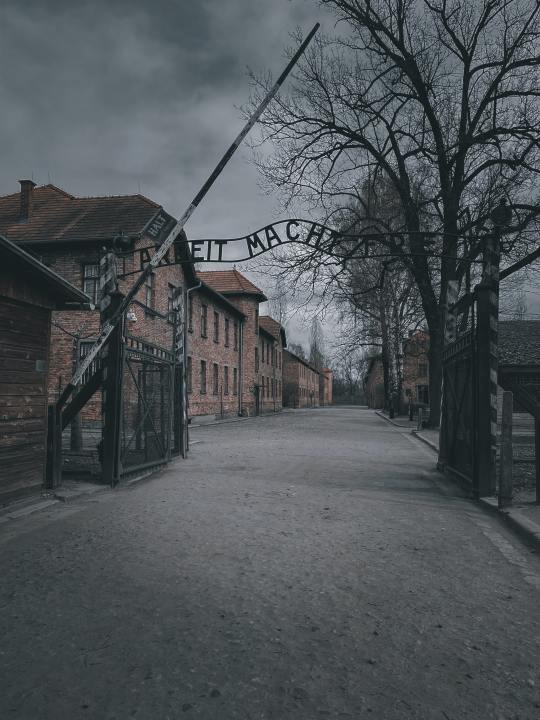
While listening to the Playing Anne Frank podcast, I ask myself a frightening question. Could this horror happen again?
Sadly, my answer is yes.
Why do I feel that way?
First, because a recent study found that only 54 percent of the world's population has heard of the Holocaust. Ignorance, is, well, ignorance. Do you think many of the Russian people know of the atrocities committed by their army and soldiers in Ukraine? Of course, they don't. The masses are fed the line that Russia is saving Ukraine from genocide and, in a note of irony, Nazis.
Second, holocaust denialism is grown into a cottage industry, especially in the U.S. In another ironic twist, numerous studies show that present-day Germans accept and denounce the atrocities committed by the Nazis in their country. While, too many in the U.S. link the Holocaust in with the faked moon landing, JFK's assassination, 9/11, and deep state doomsday scenarios.
Holocaust denial aims to cast doubt on the facts of the Holocaust as they pertain to its Jewish victims, and for years it percolated freely across Facebook. Even though such messages have been banned by Facebook since 2021 (what took them so long?), denialism still exists in the crevasses and effluent of the social media giant.
Denial adherents claim that Jews fabricated evidence of their own genocide to gain sympathy, extract reparations from Germany and facilitate the allegedly illegal acquisition of Palestinian land for the creation of Israel.
Why has Holocaust denialism grown in this country specifically? First, it doesn't help that the ex-president of the United States has dinner with a notorious holocaust denier, Nick Fuentes. Although Trump denied knowledge of the denier. Come on. Give the man credit. He cannot be that stupid. After all, he knew Fuentes from the Unite the Right rally in Charlottesville, Virginia, where hundreds of torch-bearing far-right demonstrators chanted "Jews will not replace us."
On Truth Social, owned by Trump, Holocaust denialism is a rich topic for discussion, festering on Telegram, an instant messaging site, and Gab, a social network – all known for their far-right user bases.
Trump has engaged is so many wild conspiracy theories that the truth is often obscured amid the mudslinging of wild accusations divorced from factual certitude. For example, Trump has suggested that the father of Senator Ted Cruz of Texas helped to assassinate President John F. Kennedy, and that Democrats funded the same migrant caravan traveling from Honduras to the U.S. that worried the Pittsburgh synagogue shooter.
Most Holocaust deniers want to wash away the stain of Nazism in an attempt to make Nazism an acceptable political alternative today. Many have present and past ties with hate groups and are trying to shed that image by masquerading themselves as seekers of historical truth, rather than merchants of bigotry. Holocaust denial is an important tool for anti-Semites, masquerading as a valiant search for the truth.
Second, the term “bothsidesism” has gained considerable momentum in the last few years. It describes the phenomenon of treating every opinion as equally valid, including falsehoods masquerading as objective fact. In October 2021, for example, educators in Southlake, Texas, were told if they had a book on the Holocaust in their classroom library, they would also have to have one that with an “opposing” perspective. In January 2022, Republican State Senator Scott Baldwin of Indiana said that educators “need to be impartial” while teaching students about Nazism.
In June 2022, at the American Library Association’s annual conference, author Nancy Pearl suggested that Holocaust denial books had a place in school libraries.
Other nations don't share that streak of Holocaust denialism. In 2018, Great Britain banned a prominent American Holocaust denier from entering the United Kingdom, according to a copy of correspondence from the interior ministry.
So where are we at? Seventy-eight years after U.S. soldiers found emaciated prisoners near death, mass graves, and a footprint of sadism not seen in the modern world?
There's hope, and many will not forget. Will never forget. For example, writer Alexander Verbeek recently wrote an article in Medium about Holocaust Remembrance Day.
In the article, he writes that, "The people who hid Anne Frank were breaking the law. The people who killed her were following the law."
Clearly, these Holocaust deniers need to be reminded of the tragedy of Anne Frank, her courage, and the inspiration we can draw from her ordeal.
In today's world with the January 6th insurrection, the attempt to overthrow the German government several months ago, and the recent attacks in Brazil, we need a reminder of how democracy protects us from the worst instincts of racial supremacists, extremists, and those who blame certain races and religions for their own woes.
Sadly, a conspiracy theory can provide comfort by identifying a convenient scapegoat and thereby making the world seem more straightforward and controllable.
“People can assume that if these bad guys weren’t there, then everything would be fine,” says Australian cognitive scientist Stephen Lewandowsky in a recent piece. “Whereas if you don’t believe in a conspiracy theory, then you just have to say terrible things happen randomly.”
At the end of his Medium article about the Holocaust, Verbeek writes: "Let me end with a quote from one of the other four letters that have been found, written by Zalman Gradowski, and found buried at an Auschwitz crematorium site":
"Dear finder of these notes, I have one request of you, which is, in fact, the practical objective for my writing … that my days of hell, that my hopeless tomorrow will find a purpose in the future."
Verbeek ends with: "He wrote so that his execution would find a purpose."
I think that we should never let Mr. Gradowski down.
2 notes
·
View notes
Text
Trump Says He Wants To Deport 15,000 Haitian Migrants In Springfield, As Locals' Complaints Increase

Former US President and Republican presidential candidate Donald Trump speaks during a campaign event at the Ryder Center for Health and Physical Education at Saginaw Valley State University in Saginaw, Michigan, on October 3, 2024.
Former President Donald Trump announced that he plans on deporting the large concentration of Haitian migrants in Springfield, Ohio, if he wins re-election in November and defeats Kamala Harris.
During a NewsNation interview on Wednesday, Trump revealed that he would remove the migrants’ temporary protected status (TPS) and initiate the deportation process. He noted that he plans to keep his word on carrying out a “large deportation” campaign aimed at removing the millions of illegal immigrants who took advantage of Biden’s open border policies.
“It has nothing to do with Haiti or anything else. You have to remove the people, and you have to bring them back to their own country,” Trump stated.
“Springfield is such a beautiful place. Have you seen what’s happened to it? It’s been overrun. You can’t do that to people. I’d revoke [their protected status], and I’d bring [the migrants] back to their country,” he continued.
Trump previously attempted to revoke the TPS program in his last administration for migrants from Haiti, El Salvador, Honduras, Nicaragua, Nepal, and Sudan.
His attempts, however, were unsuccessful, as the United States District Court for the Northern District of California stepped in and blocked the federal government from changing the migrants’ protected status for five years.
Currently, the Haitian migrant community in Springfield is estimated to make up around 15,000 to 20,000 people, putting a strain on city resources to accommodate the rapid influx of migrants in an otherwise small, quiet town.
According to the Congressional Research Service, over 200,000 Haitian immigrants have applied for and been approved to receive TPS services.
The city of Springville saw the national spotlight after unconfirmed reports surfaced claiming Haitian immigrants were killing and eating pets, as well as local geese and ducks, which Trump highlighted in the presidential debate against Vice President Kamala Harris.
“I’m sitting here, I’m riding on the trail, I’m going to my orientation for my job today, and I see a group of Haitian people, there was about four of them, they all had geese in their hand,” said a 9-1-1 caller in Springfield to a police dispatcher.
Here is the official police report showing that the 911 call took place on August 26th – Weeks before the rumors about Haitian Migrants killing park animals went viral. pic.twitter.com/uNn9Pzcfo4— Donald Trump Jr. (@DonaldJTrumpJr) September 11, 2024

Many Springfield city council attendees and TikTokers who live in the area also corroborated those claims.
Additionally, local residents have claimed that the Haitians do not understand American road or driving laws, and that many of them have been causing dangerous accidents.
“These Haitians are running into trash cans. They’re running into buildings. They’re flipping cars in the middle of the street, and I don’t know how like y’all can be comfortable with this,” said a local resident during a city council meeting on August 28th.
— Tayler Hansen (@TaylerUSA) October 2, 2024
It is unclear how the migrants have enough money to purchase these vehicles, but many Haitians who have been living in Springfield for a year and a half or more have reportedly been able to find jobs and have been given enough government funds each month to purchase homes or rent out apartments.
“The slave revolt that brought Haiti independence indeed relied on voodoo, the New World version of ancestral African faiths. To this day, by various scholarly estimates, 50 percent to 95 percent of Haitians practice at least elements of voodoo, often in conjunction with Catholicism,” The New York Times reported.
After the “unconfirmed pet-eating” reports surfaced, a member of GOP vice presidential candidate JD Vance’s (R-Ohio) team reached out to Springfield City Manager Bryan Heck about the reports, to which Heck responded, stating, “I told him no. There was no verifiable evidence or reports to show this was true. I told them these claims were baseless.”
Although the pet-eating claims are still unconfirmed, Vance said that he intends to uplift the concerns of local residents in Springfield who miss how their city once was prior to the influx of third world foreigners.
“We don’t blame the Haitian migrants for coming to Springfield,” Vance stated. “We blame Kamala Harris for opening the American southern border and inviting 20,000 people to get dropped in a small Ohio town.”
Stay informed! Receive breaking news blasts directly to your inbox for free. Subscribe here. https://www.oann.com/alerts
0 notes
Text
Most of the time they're just writing fanfic of his policies anyway. The headline will be "Trump lays out plan for reducing inflation with targeted tariffs at rally" and then you look at the rally footage and it's "Who likes economy? You know, the economy was so much better before... You know what they're doing in Honduras? They're sending the, they're not nice people, they're sending them. And she's not going to do anything about it. When I was president, you know a tariff? Funny word 'tariff', makes me think of Omar Sharif. He used to write a bridge column for some newspapers, maybe he still does. Nobody knows."



263 notes
·
View notes
Text
Debunking Trump's immigration lies
"Trump's better on immigration than Biden/Harris."
No he's not. Trump removed the legal mechanisms for immigration, which juiced the numbers to make it look like he decreased it overall, but did little to stem the tide of actual illegal immigration in the US (and also, he separated families and locked kids up in cages, but for some reason enough people aren't "compelled" by that argument /s).
So let's look at the fucking facts:

Utterly destroyed internal mechanisms for legal migration, including disrupting the offices. In fact, according to this article:
The COVID‐19‐related restrictions were the most severe and impactful part of Trump’s immigration policy.
But actual ILLEGAL immigration?

Trump failed to increase removals because local jurisdictions refused to cooperate with his administration, continuing a trend begun during the Obama administration in response to their deportation efforts. As a result, the population of illegal immigrants remained about the same as when he took office (Figure 4).
https://nationalinterest.org/blog/reboot/fact-president-trump-only-reduced-legal-not-illegal-immigration-176905
And as for Kamala Harris? What has she done, not as a border czar but someone focused on "root causes"?
She's raised money. Lots of it, in fact, with particular focus on Central America, to encourage economic reinvestment in their countries to discourage emigration.
“Vice President Harris continues to lead the effort to address the root causes of migration from Honduras, Guatemala, and El Salvador, including by generating more than $5.2 billion in investments into the region to give people economic opportunity at home.
And some of the results?
“She had a very narrow mandate, which was to be the diplomatic representative in Central America at the time when most unauthorized immigration was coming from Central America,” said Andrew Selee, president of the Migration Policy Institute, a nonpartisan think tank based in Washington. Since 2021, immigration from the Central American countries of Guatemala, El Salvador and Honduras, once the leaders in illegal immigration across the southwest border, has fallen from 86,089 in March 2021 to 25,015 in June 2024, according to Customs and Border Protection data.
And I want to be clear - those reductions are NOT solely because of Kamala Harris, but the fierce efforts of an interconnected network of organizers and government officials working to improve the situation. But I also want to be clear - her efforts have been only to HELP. Not harm.
Now you know!
1 note
·
View note
Text
Under increasing pressure to migrate, more women are dying at the US-Mexico border
Historically, men made up the majority of those dying in the border desert. But the balance is shifting.
In Southern Arizona, on an over-100-degree day in June, humanitarian aid workers found a group of migrants standing in a thin slice of shade formed by the large steel slats of the border wall. Among them were a pregnant woman, an elderly woman, two women showing signs of heat exhaustion and young children. In total, about 30 people had crossed into the United States and were waiting for the Border Patrol to pick them up so they could make an asylum claim. They were some of the lucky ones. Advocates say that more and more people are ending up stranded in the desert because of onerous Trump and Biden administration restrictions that make it difficult to ask for asylum at official ports of entry. Instead, people are trying to cross through remote desert areas.
[...]
Crossing the desert is a dangerous gamble, but often the only option left for asylum seekers after their long and arduous journeys from places like Venezuela, Honduras, Guatemala and Haiti, which are beset by violence, political instability and poverty. “We know, based on 20-plus years, that the harder you make it, the greater the risks that they will take in the desert, whether it is in Texas or Arizona,” Jones said. “It means that risk-taking exponentially increases the likelihood you will die.”
[...]
Melanie Nezer, vice president of advocacy and external relations for the Women’s Refugee Commission, said women are driven to migrate for the same reason as men: lack of employment, persecution by local armed gangs and, increasingly, climate change, which is affecting farming yields and food security. Climate-intensified disasters have also led to high levels of displacement around the world and are linked to higher rates of domestic violence and sexual assault in their aftermath. All these factors interact in ways that can lead a person or a family to migrate. “A lot of times when you’re talking about women, you’re also talking about children,” Nezer said. Women, she said, “don’t want their kids to be forcibly recruited by gangs. They want their kids to be able to grow up and go to school and work and have a future.”
0 notes
Text
Saturday, March 9, 2024
Amid explosive demand, America is running short on power (Washington Post) Vast swaths of the United States are at risk of running short of power as electricity-hungry data centers and clean-technology factories proliferate around the country, leaving utilities and regulators grasping for credible plans to expand the nation’s creaking power grid. In Georgia, demand for industrial power is surging to record highs, with the projection of electricity use for the next decade now 17 times what it was only recently. Arizona Public Service, the largest utility in that state, is also struggling to keep up, projecting it will be out of transmission capacity before the end of the decade absent major upgrades. Northern Virginia needs the equivalent of several large nuclear power plants to serve all the new data centers planned and under construction. Texas, where electricity shortages are already routine on hot summer days, faces the same dilemma. “When you look at the numbers, it is staggering,” said Jason Shaw, chairman of the Georgia Public Service Commission, which regulates electricity. “It makes you scratch your head and wonder how we ended up in this situation. How were the projections that far off? This has created a challenge like we have never seen before.”
Big American companies benefit from Chinese ad spending spree (NYT) While the relationship between the U.S. and China remains contentious, the two superpowers are still as economically entangled as ever. Despite the U.S. military projecting a war with Beijing by 2027, a surprising new connection across the Pacific has developed in recent years—massive Chinese companies looking to gain a global customer base have begun shelling out billions of dollars to advertise through some of America’s largest tech companies like Meta and Google. Temu and Shein are some of China’s biggest overseas ad buyers. According to tracking services, Temu has bought over 1.4 million Google ads and has created 26,000 different ads on Meta platforms. Shein, a close competitor, has run tens of thousands of ads on Google alone. “What companies like Temu have done is really just open a fire hose of money that it is pouring into ads,” said one marketing analyst. What’s the reason behind this spike in sponsorships? “There’s a limit on the degree that a company can grow in China,” said one economic researcher, citing the fact that Chinese companies can face crackdowns if they run afoul of the state. “Xi Jinping is perfectly happy for Chinese companies to make money overseas as long as they toe the line within China.”
Honduran ex-president convicted of helping send tons of cocaine to U.S. (Washington Post) Former Honduran president Juan Orlando Hernández, a onetime American ally, was convicted in a New York court Friday of helping drug traffickers send tons of cocaine to the United States in exchange for hefty bribes that fueled his political career. Hernández was accused of using police and the military to guard U.S.-bound cocaine shipments, and of sharing sensitive U.S. law enforcement information with traffickers. Assistant U.S. Attorney Jacob Gutwillig said Hernández “paved a cocaine superhighway to the United States.” Yet even as Hernández presided over what prosecutors called a “narco-state,” U.S. authorities continued to work closely with him. “How is it possible the U.S. government did not know this stuff was going on?” said Dana Frank, a historian and Honduras expert at the University of California at Santa Cruz. “They chose to look the other way.”
As gangs attack a critical port, ‘Haiti will go hungry soon’ (Washington Post) First the gangs blocked the roads to Haiti’s capital. Then they attacked the airport. Now they have breached the city’s main port, cutting off the capital from one of its last remaining lifelines for food and supplies as the country teeters toward collapse. On Wednesday night, dozens of gang members stormed the most important port terminal in Port-au-Prince, looting containers, damaging the port’s security apparatus and forcing the terminal to suspend its operations indefinitely. “Everything has stopped. Medical supplies, food cannot come to Port-au-Prince. Right now nothing can enter by sea, by air, or by road,” said one manager in the shipping sector, who asked to remain anonymous because he was not authorized to speak to reporters. “It’s a disaster. Hunger will be the next step.”
Young Europeans are embracing the far right. (Washington Post) The surprising voters driving the far right’s surge in Europe scrambled for selfies inside a suburban auditorium. Rita Matias, a 25-year old ultraconservative and social media influencer, had just called for migrant quotas and curbs on abortion in a political debate. Now, her more progressive opponents in staid blazers and pullovers watched like wallflowers as star-struck 18-year-olds jostled for photos with the young woman. “Are you a party member?” she asked one fan, who shyly shook his head. “No? Don’t worry. We’ll get you signed up.” On a continent better known for left-wing youth activism a la Greta Thunberg, polls show that young Europeans are fueling the growth of the far right from France to Sweden to the Netherlands. And in a year when former president Donald Trump is making a bid to take back the White House, multiple European governments may be headed for a rightward shift, propelled by voters in their late teens, 20s and early 30s. “The [mainstream] parties aren’t talking the language of the young, but these more radical parties are,” said Peter Kreko, director of Political Capital, a Budapest-based think tank. “They are channeling the disillusionment of young voters with politics.”
Mutual Frustrations Arise in U.S.-Ukraine Alliance (NYT) More than two years into their wartime alliance, the bond between the United States and Ukraine is showing signs of wear and tear, giving way to mutual frustration and a feeling that the relationship might be stuck in a bit of a rut. It is the stuff that often strains relationships—finances, different priorities and complaints about not being heard. For the Pentagon, the exasperation comes down to a single, recurring issue: American military strategists, including Defense Secretary Lloyd J. Austin III, believe that Ukraine needs to concentrate its forces on one big fight at a time. Instead, President Volodymyr Zelensky, who has vowed to drive Russia out of every inch of Ukraine, expends his forces in battles for towns that U.S. officials say lack strategic value. For its part, Ukraine is increasingly disheartened that American political paralysis has resulted in shortages of ammunition for troops on the front. As each day goes by without a fresh supply of munitions and artillery, and Ukrainian crews ration the shells they have, morale is suffering.
Crowdfunding, Auctions and Raffles: How Ukrainians Are Aiding the Army (NYT) Earlier this year, Daria Chervona, a photo retoucher from Kyiv, was busy trying to raise 78 million Ukrainian hryvnia, about $2 million, for Ukraine’s army, posting daily on social media to urge friends and acquaintances to chip in. That was a high bar, but after a few weeks she announced she had cleared it, reaching her target. Ms. Chervona attributes her success to a system she adopted last summer: dividing the work among dozens of people, each tasked with collecting money from friends, in a process that she said can yield large sums. Each fund-raiser is then highlighted in a social media post with their picture, tapping into civilians’ desire to be recognized as active participants in the war effort. Since the early days of the war, thousands of volunteers have led crowdfunding efforts that have been crucial in supplying the Ukrainian military with critical equipment. They have become part of Ukraine’s social fabric, with nearly 80 percent of the population now donating, according to a recent survey. They have held auctions, organized raffles and invited influencers to participate in promotional clips.
Settling For More Conflict (BBC) Israel has announced plans to build thousands of new houses in the occupied West Bank, expanding the country’s settlements in the West Bank, considered by most of the international community to be illegal. A total of 3,476 new settler homes were announced as part of the plans. “The enemies try to harm and weaken us but we will continue to build and be built up in this land,” wrote Israeli Finance Minister Bezalel Smotrich on X. U.S. Secretary of State Antony Blinken expressed his disappointment with Israel’s expansion plans, reiterating the White House’s position that Israeli settlements in the West Bank are illegal.
Israeli tank ‘likely’ fired machine gun at reporters after deadly shelling, report finds (Reuters) An Israeli tank crew killed a Reuters reporter in Lebanon in October by firing two shells at a clearly identified group of journalists and then “likely” opened fire on them with a heavy machine gun in an attack that lasted 1 minute and 45 seconds, according to a report into the incident published on Thursday. The report, by the Netherlands Organisation for Applied Scientific Research (TNO)—which was contracted by Reuters to analyse evidence from the Oct. 13 attack that killed visuals journalist Issam Abdallah—found that a tank 1.34 km away in Israel fired two 120 mm rounds at the reporters. The first shell killed Abdallah, 37, and severely wounded Agence France-Presse (AFP) photographer Christina Assi, 28.
After months of warnings that Israel’s siege is causing famine, children begin to die in Gaza (AP) After months of warnings over the risk of famine in Gaza under Israel’s bombardment, offensives and siege, children are starting to die. Hunger is most acute in northern Gaza, which has been isolated by Israeli forces and has suffered long cutoffs of food supply deliveries. At least 20 people have died from malnutrition and dehydration at the north’s Kamal Adwan and Shifa hospitals, according to the Health Ministry. Most of the dead are children. Particularly vulnerable children are also beginning to succumb in the south, where access to aid is more regular. At the Emirati Hospital in Rafah, 16 premature babies have died of malnutrition-related causes over the past five weeks, one of the senior doctors told The Associated Press.
Palestinians struggle to connect and get news amid digital shutdowns in Gaza (Reuters) Internet service in Gaza has declined by 80 to 90% following the Israeli invasion, creating extreme challenges to sharing and receiving vital information. Because Israel controls internet infrastructure in Gaza, organizations that help communities in crisis navigate digital shutdowns say the usual workarounds aren’t effective. Adding to the challenge is the lack of functional devices such as phones or laptops as many residents have lost them while fleeing, or can’t charge them regularly. The primary source of news is now radio, and those with phones are turning to Telegram, where neighborhood-based channels are used to connect with loved ones and share vital updates.
Egypt Unlocks $8 Billion IMF Loan to Ease Crisis (Bloomberg) Egypt and the International Monetary Fund agreed to more than double the country’s rescue program to $8 billion, the culmination of recent global efforts to stabilize the cash-strapped regional linchpin squeezed by wars and inflation. The announcement followed swift moves earlier Wednesday to float the currency—tanking the pound as much as 38%—and hike interest rates by a record 600 basis points as the country led by President Abdel-Fattah El-Sisi has sought to meet long-standing economic reforms demanded from the IMF and backed by the US. The IMF deal—as well as a crucial $35 billion recent investment commitment from the United Arab Emirates—underscores Egypt’s importance as a Middle East stalwart that’s too big to fail amid Israel’s war with Hamas and a conflict raging in neighboring Sudan.
Gunmen abduct 287 students in the latest school attack in Nigeria’s northwest, headteacher says (AP) Gunmen attacked a school in Nigeria’s northwest region Thursday and abducted at least 287 students, the headteacher told authorities, marking the second mass abduction in the West African nation in less than a week. Abductions of students from schools in northern Nigeria are common and have become a source of concern since 2014 when Islamic extremists kidnapped over 200 schoolgirls in Borno state’s Chibok village.
1 note
·
View note
Text
At the start of the interview, journalist and Televisa anchor Enrique Acevedo cited how a New York Times/Siena poll showed Trump with 42% of Latino support across six battleground states.
Trump’s initial reaction was filled with praise and compliments. It was a far cry from his now infamous anti-Mexican, anti-Latino claims during the 2016 campaign that Mexico was sending drug dealers and rapists to take over the U.S., or the time he told anchor Jorge Ramos to “go back to Univision” when Trump felt Ramos had spoken out of turn at a press conference.
“The Latino vote is so incredible because they’re unbelievable people. They have incredible skills, incredible energy, and they’re very entrepreneurial. All you have to do is look at the owners of Univision,” Trump told Acevedo in English on Thursday night. “They’re unbelievable entrepreneurial people. And they like me. You know, there’s never been anything like it in the Republican Party. I’ve been a Republican and am a Republican, and we have tremendous support from the, I call Hispanic, Latino, you have lots of different terms. But it all means the same thing as far as I’m concerned. It’s, they’re just great people, incredible people. And they also want security if they’re in the United States or if they’re in Mexico or anywhere else. They feel strong about security, and we provide that.”
Those compliments soon veered into other realities that Latinos in the U.S. has grappled with for years. Those “coming in legally” like Cubans, Venezuelans and Nicaraguans should be lauded, Trump told Acevedo. But countries like El Salvador and Honduras “are not sending their best.”
“They’re sending us MS13. They’re sending us gang members from all over the place. They’re sending us people that have mental problems from mental institutions” he said. Later in the interview, he even compared those immigrants to a fictional character. “That’s 'Silence of the Lambs.' That’s Hannibal Lecter. You ever hear of Hannibal Lecter? Not a nice person. But these are people that are very, very disturbed, very, very mentally ill. They’re being dropped into the United States.” (Trump did allow that “good people are coming in, too.”)
Such remarks will elicit only a fraction of the outrage or pushback Trump received when he first ran for president, and not just because his xenophobia is so well documented. Noticias Univision’s decision to broadcast the interview on the main Univision network with Spanish dubbing meant that not only was Trump’s message shared in both languages, but that the Spanish interpreter made the words sound more muted, palatable and measured. Watching the Spanish-language version was like a dubbed movie, with Trump as a native Spanish speaker running for president."
0 notes